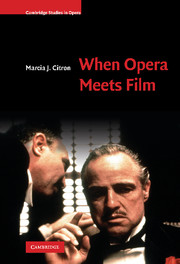Book contents
- Frontmatter
- Contents
- List of figures
- List of tables
- List of music examples
- Acknowledgments
- Introduction
- Part I Style
- Part II Subjectivity
- 3 Subjectivity in the opera-films of Jean-Pierre Ponnelle
- 4 Don Giovanni and subjectivity in Claude Chabrol's La Cérémonie
- Part III Desire
- Epilogue
- Notes
- Bibliography
- Filmography and videography
- Index
4 - Don Giovanni and subjectivity in Claude Chabrol's La Cérémonie
from Part II - Subjectivity
Published online by Cambridge University Press: 04 August 2010
- Frontmatter
- Contents
- List of figures
- List of tables
- List of music examples
- Acknowledgments
- Introduction
- Part I Style
- Part II Subjectivity
- 3 Subjectivity in the opera-films of Jean-Pierre Ponnelle
- 4 Don Giovanni and subjectivity in Claude Chabrol's La Cérémonie
- Part III Desire
- Epilogue
- Notes
- Bibliography
- Filmography and videography
- Index
Summary
Opera presented on television in a film's story is rare in cinema. One of the most striking examples occurs in Claude Chabrol's film La Cérémonie (1995). In this adaptation of Ruth Rendell's crime novel A Judgement in Stone (1977), a well-heeled family is murdered by their illiterate maid and her zany girlfriend as they watch a telecast of Don Giovanni. Resentment quietly builds in the film until it implodes in the climactic scene of the opera broadcast, which is key to the film's success. Not only does Chabrol deploy his formidable subjective methods in the presentation of the opera, but he leaves us with an interpretation of Don Giovanni that is suggestive for Mozart's work.
Chabrol has enjoyed a productive career and emerged as an éminence grise of French cinema. A founding member of the New Wave and contributor to its mouthpiece Cahiers du cinéma, Chabrol has made over fifty films and is one of the most prolific living directors. His output is eclectic and influenced by key developments of the late twentieth century. According to biographer Guy Austin, these include “neorealism, the new wave, the trauma of the Algerian War, the political legacy of 1968, the rise of the consumer society and the ‘pompidolien’ bourgeoisie, the perennial popularity of the thriller, the tension between television and cinema, the decline of Marxism.”
- Type
- Chapter
- Information
- When Opera Meets Film , pp. 136 - 170Publisher: Cambridge University PressPrint publication year: 2010



